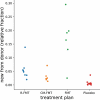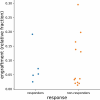Effect of antibiotic pretreatment on bacterial engraftment after Fecal Microbiota Transplant (FMT) in IBS-D
- PMID: 35014601
- PMCID: PMC8757476
- DOI: 10.1080/19490976.2021.2020067
Effect of antibiotic pretreatment on bacterial engraftment after Fecal Microbiota Transplant (FMT) in IBS-D
Abstract
Fecal microbiota transplantation (FMT) is an attractive strategy to correct microbial dysbiosis in diarrhea-predominant irritable bowel syndrome (IBS-D). Although the mechanism of FMT is thought to be bacterial engraftment, the best approach to achieve engraftment after FMT in IBS-D (and other diseases) is not clear. We evaluated the effect of FMT (with or without pretreatment with antibiotics) on gut microbiome and symptoms in patients with IBS-D. In this randomized, placebo-controlled, single-center study, 44 patients with IBS-D with a least moderate severity (IBS severity scoring system, i.e., IBS-SSS, ≥175) were randomly assigned to one of four groups: single-dose oral FMT alone, single-dose oral FMT following a 7-day pretreatment course of Ciprofloxacin and Metronidazole (CM-FMT) or Rifaximin (R-FMT), or Placebo FMT. Primary endpoint was engraftment post-FMT and secondary endpoints were changes in IBS-SSS, and IBS-quality of life (IBS-QOL) at week 10. Median engraftment was significantly different among the three FMT groups (P = .013). Engraftment post-FMT was significantly higher in the FMT alone arm (15.5%) compared to that in R-FMT group (5%, P = .04) and CM-FMT group (2.4%, P = .002). The mean change in IBS-SSS and IBS-QOL from baseline were not significantly different among the four groups or between the three FMT groups combined vs. placebo at week 10. In summary, antibiotic pretreatment significantly reduced bacterial engraftment after FMT in patients with IBS-D.
Trial registration: ClinicalTrials.gov NCT02847481.
Keywords: Microbiome; dysbiosis; fecal microbiota transfer; fecal therapy.
Conflict of interest statement
Mark Smith and Zain Kassam are employees/shareholders of Finch Therapeutics
Figures





References
-
- Sperber AD, Dumitrascu D, Fukudo S, Gerson C, Ghoshal UC, Gwee KA, Hungin APS, Kang J-Y, Minhu C, Schmulson M, et al. The global prevalence of IBS in adults remains elusive due to the heterogeneity of studies: a Rome Foundation working team literature review. Gut. 2017;66:1075–12. doi:10.1136/gutjnl-2015-311240. - DOI - PubMed
-
- Rangan V, Ballou S, Shin A, Camilleri M, Lembo A. Beth Israel Deaconess medical center GI motility working group, Lembo A. Use of treatments for Irritable bowel syndrome and patient satisfaction, based on IBS in America survey. Gastroenterology. 2019;158:786–788.e1. doi:10.1053/j.gastro.2019.10.036. - DOI - PMC - PubMed
-
- Singh P, Ballou S, Katon J, Takazawa E, Rangan V, Mukherjee R, Iturrino J, Nee J, Lembo A. Symptom severity, mood, and healthcare use are associated with satisfaction in patients with irritable bowel syndrome. Clin Gastroenterol Hepatol. 2020;18:2945–2951.e1. doi:10.1016/j.cgh.2020.01.045. - DOI - PMC - PubMed
Publication types
MeSH terms
Substances
Associated data
Grants and funding
LinkOut - more resources
Full Text Sources
Medical
